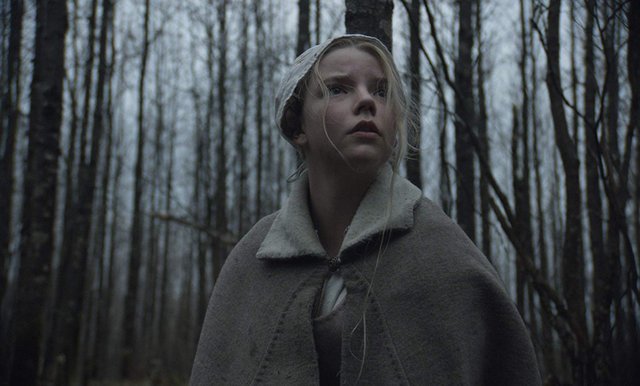Film Review: 'The Witch' (2015): Critics Aim and Miss

Anya Taylor-Joy finds out that black goats can be troublesome in Robert Eggers's The Witch. Photo courtesy of the IMDb.
The Witch (2015), written and directed by Robert Eggers; starring Ralph Ineson, Kate Dickie, Anya Taylor-Joy, and William Scrimshaw.
Why, critics, why? This film was described as a “masterpiece” by many critics when it debuted a few years ago. I found it very disappointing, a collection of disparate parts hung on a too-thin string of a plot. And it’s also very annoying, for several reasons I'll get into below.
The story follows a family of New England colonists in the early 17th Century. They are parents William and Katherine, and their five children: Thomasin, Caleb, Mercy, Jonas, and infant Samuel. Mercy and Jonas are girl/boy twins.
As the story opens, the family is expelled from their colony for having the wrong religious beliefs, and move to a remote farm on the edge of a deep forest. One day, the elder girl, Thomasin (played by Anya Taylor-Joy), who is about 13 or 14, is given the task of watching Baby Samuel outside, and the baby disappears while she’s not looking.
A witch who lives in the woods took him and apparently ate him, but the family doesn’t know that. (The baby-crunching scene is shown in shadows only briefly, so don’t get your hopes up if you’re a gorehound.) After that, pretty much nothing happens for a good half-hour or so, except that the family prays and bickers, then bickers and prays.
Meanwhile, their misfortunes increase: crops fail, chickens deliver bloody eggs, the family hunting dog is lost. The mother never recovers from the grief of losing Samuel and blames Thomasin, treating her elder daughter horribly. The twins are spoiled brats who play with a black goat all the time. A silver cup disappears, and the mother blames Thomasin (of course).
Finally, William (Ralph Ineson) and Katherine (Kate Dickie) are so broke and desperate that they send Thomasin out to work for another family, and Thomasin rides the family’s only horse, accompanied by Caleb (William Scrimshaw), through the dark forest to the other farm. But the horse bolts and dumps Thomasin on the ground and Caleb gets lost in the woods. When he finally returns, he’s naked and half-dead with a fever. Then Caleb dies, and the mother accuses Thomasin of being a witch who killed him with her spells. Thomasin denies she's the witch, and blames the twins because they talk to the goat.
Father William decides that the three remaining children must be locked up outside the family’s little cottage until he figures out who’s the witch. This is a super-dumb move, but we’ve already learned by this point that these people are pretty damned stupid. Of course, bad things happen to the twins while they are locked in the barn, and the mother blames Thomasin again, with tragic results.
Now for the annoying parts: All of the talky, slow dialogue is in archaic English, due to the director’s apparent insistence on historical accuracy. Historical accuracy is important, but the dialogue could have been lightened up a tad to make it more understandable. The constant praying and quoting from Bible verses is another annoying characteristic--and again, it could have been lightened up a little without sacrificing historical accuracy. The endless bickering is important to the plot, but it does make the characters less sympathic in the eyes of the audience. Something could have been done to improve the likeability of at least some of the characters.
Technically, I found the camerawork somewhat pedestrian--beyond a stunning filter that turns everything a sort of silvery gray, accentuated by costumes of the same color. To be fair, all of the footage was shot in either natural light or candle light, which is an achievement in and of itself.
The acting is quite good, especially from Taylor-Joy as the put-upon Thomasin; she is a beautiful girl who looks like a figure in a painting by Thomas Gainsborough. The music, however, is dreary and droning (possibly intended to be that way). There are a few decent creepy/unsettling scenes, but they are brief and fairly random.
But in the end, unfortunately, the main problem is a meandering, pointless plot. A witch attacks a family—for reasons unknown—and they go crazy and most of them die. The end. There’s no dramatic tension or point-counterpoint, because the witch wins every round in a deadly game the family members don’t even know that they’re playing.
Seems like the witch would have worked better as a metaphor than a character. The atmosphere of this movie is intense, though. Have to recommend it.
I remember being on the fence with this one. I found the presentation to be boring but later found myself pondering the film and the eventual eerie -ness that it planted in my head. I think I enjoy the memory of the film a lot more than I actually enjoyed the film :)
Yes, the parts are greater than the sum total. The director knows how to craft some intriguing scenes but he doesn't know how to put them together in a compelling story.
i used to feature films years ago in the guesthouse that I owned. Many of the better ones would end up being played on multiple nights. This one got only one showing and half the audience left before it finished :)
Lol!
To listen to the audio version of this article click on the play image.

Brought to you by @tts. If you find it useful please consider upvoting this reply.